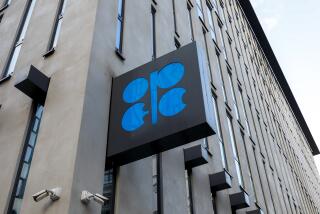OPEC to Boost Output by 6.5%
- Share via
WASHINGTON — The Organization of the Petroleum Exporting Countries agreed Sunday to boost production to offset the loss of exports from strike-torn Venezuela and to halt a price spiral that has pushed crude oil to two-year highs.
The decision, endorsed during an emergency meeting in Vienna, is intended to calm oil traders rattled by the six-week work stoppage by state oil workers in protest of Venezuelan President Hugo Chavez and by the prospect of U.S. military action against Iraq.
“OPEC is trying to send a very strong message that it will do its utmost to stabilize demand and supply,” OPEC President Abdullah ibn Hamad al Attiyah said at the conclusion of the meeting. “Now we will wait for the market to react.”
The agreement raises the official production ceiling of the “OPEC 10” nations -- all of the organization’s members except Iraq -- to 24.5 million barrels a day from 23 million barrels, a 6.5% increase. It was approved by representatives of Saudi Arabia, Iran, Venezuela, the United Arab Emirates, Kuwait, Nigeria, Libya, Indonesia, Algeria and Qatar.
Although Attiyah, who also is the oil minister of Qatar, said the change would take effect Feb. 1, independent oil analysts said the new ceiling merely formalizes recent production increases by OPEC members who routinely exceed their allotted quotas.
“This meeting is not going to result in more production,” said Deutsche Bank oil strategist Adam Sieminski in London. “This meeting was to make clear publicly that they had already increased production to make up for the shortfall.”
Still, analysts said it will take all of the additional production that OPEC has promised to satisfy world demand for crude oil. Venezuela’s new quota is 2.8 million barrels a day, but the ongoing strike by oil workers and managers has reduced its output to about 500,000 barrels.
Some of Venezuela’s lost production has been made up by Iraq, which has been pumping more than 2 million barrels a day in recent weeks. Iraq is exempt from OPEC’s production-sharing allocations because its output has been subject to United Nations oversight since the 1991 Gulf War.
Venezuelan oil comprises about 14% of U.S. oil imports.
The reduction of Venezuela’s exports and the possibility that Iraqi production will be interrupted by war have added about $5 to the price of a 42-gallon barrel of oil.
Crude oil for February delivery closed at $31.68 Friday on the New York Mercantile Exchange after touching a two-year high of $33.33 earlier in the week.
A sustained increase in oil prices would act as a drag on the world economy, which has not fully recovered from the last global slump.
“Our economists worry about oil going to $40, $45 a barrel,” said Michael Rothman, senior oil analyst for Merrill Lynch. “Because the recovery is kind of limping along and the potential is there for sharply higher prices, our expectation was that OPEC would step into the void and push incremental barrels into the market.”
OPEC’s decision will provide breathing room for the Bush administration to continue its preparations for possible war in Iraq, with less risk of an oil price surge that could sap the world economy. The State Department said last week that it regarded movement toward a quota increase as “a positive development.”
The action may reduce pressure on the administration to tap the U.S. Strategic Petroleum Reserve to make up for lost Venezuelan exports. Several oil companies have requested a drawdown, but the administration has resisted, preferring to leave the underground stockpiles untouched until a significant shortfall develops.
But the move is not without risk for OPEC.
The production increases will boost supplies just before the traditionally weak spring season, when winter demand for fuel oil has subsided in the Northern Hemisphere and summer demand for gasoline has not yet materialized.
For some members, the benefits may outweigh the risks. Before the meeting, one of the most vocal advocates of a quota increase was Saudi Arabia, whose relations with the United States have been strained by disagreements over its role in the war on terrorism and the U.S. campaign against Saddam Hussein.
Moreover, Saudi Arabia has much more spare production capacity than any other OPEC member, so it is likely to receive the lion’s share of additional revenue generated by the quota increase.
Amy Myers Jaffe, senior energy analyst at Rice University’s Baker Institute, said she interpreted OPEC’s announcement as a somewhat belated affirmation of its willingness to make sure the crisis in Venezuela does not lead to gas station lines or sky-high prices.
“The last thing the market wants to hear is that if there’s a shortfall, OPEC’s not going to step in,” Jaffe said.
But it may take more than a pledge to make up Venezuela’s lost production and to remove all of the upward pressure on prices, analysts said.
“It’s kind of an official, temporary Band-Aid for the Venezuelan problem” said Merrill Lynch’s Rothman. “At the end of the day, the markets are only going to be assuaged by the appearance of physical oil. It’s the production and delivery of those actual barrels that becomes critical.”
*
Times wire services were used in compiling this report.
More to Read
Sign up for Essential California
The most important California stories and recommendations in your inbox every morning.
You may occasionally receive promotional content from the Los Angeles Times.











